Seawater desalination is an effective way of combating water stress in arid coastal regions. It is a solution with great potential, considering that 40% of the world’s population live within 100 km of the sea, and 25% within 25 km. Desalination is also a suitable means of providing drinking water in areas where natural water resources are subject to salinization: river estuaries, inland brackish or underground water.
Almost 300 million people around the world rely on seawater desalination, according to the International Desalination Association (IDA).
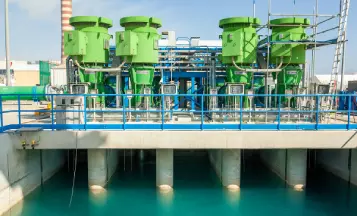
Desalination raises issues of public health, resilience and adaptation to the effects of climate change, regional dynamism and even economic development. Today, it is essentially a municipal market. However, more and more industrial companies are turning to these technologies, even if the capacity of these plants is still lower than that of plants designed to produce drinking water.
How do we desalinate seawater?
With a total treatment capacity of around 13 million m3 of water daily, at more than 2,300 sites in 44 countries across the world, we are the world leader in desalination. We support municipalities and industries all over the world in implementing desalination strategies, which we are the only ones in the world to master.
Once extracted, seawater undergoes several stages of pretreatment prior to desalination. We offer two types of technology:
- desalination by distillation: salts and water are separated by several evaporation cycles. This is also known as thermal desalination;
- membrane desalination: filtration is carried out by reverse osmosis, which involves pushing water under high pressure through a membrane that retains up to 95% of salt particles and 99% of impurities.
We can combine these two processes to create hybrid installations. The desalinated water then undergoes various post-treatment phases where it is demineralized and disinfected.
|Also read our expert's article: Water stress in coastal areas: the solution of water desalination
Renewable energy and AI to optimize desalination
Desalination is currently undergoing a major evolution thanks to significant advancements. On one hand, the increasing integration of renewable energies, notably solar and wind, combined with energy optimization of processes, is profoundly transforming the sector. This energy transition not only allows for a considerable reduction in the carbon footprint of facilities, but also lowers operating costs, making desalination accessible to a greater number of regions around the globe. On the other hand, digitalization and artificial intelligence greatly improve the management of facilities. In particular, these technologies enable sophisticated predictive maintenance of reverse osmosis membranes, optimizing their lifespan and performance. AI algorithms analyze operating parameters in real time, anticipate malfunctions, and automatically adjust operating conditions, thus guaranteeing increased reliability while reducing maintenance and renewal costs.
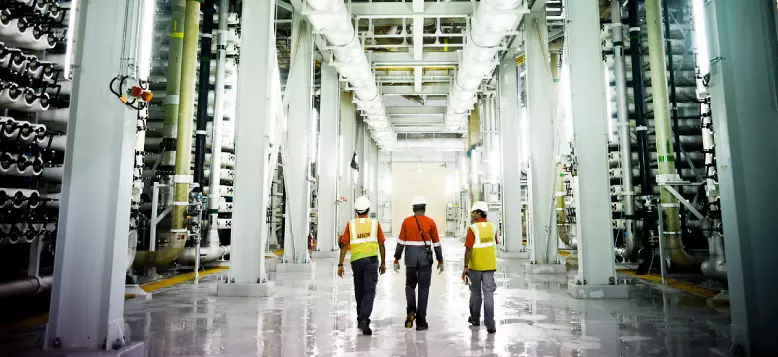
Are you a local authority or industrial customer? What are the benefits for you?
- Exploiting an inexhaustible natural resource
- Enabling and securing access to water resources
- Improving public health
We did it!
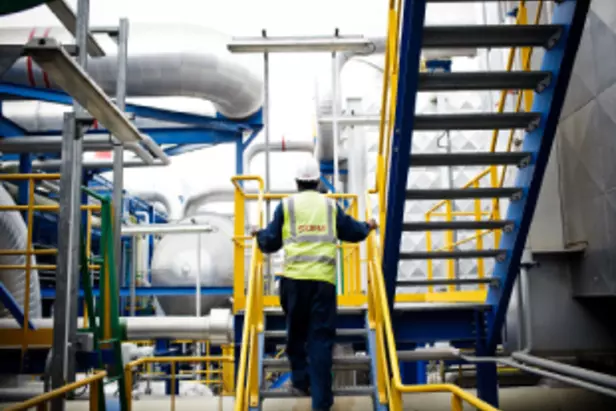
In Fujairah, in the United Arab Emirates, in response to local people’s growing need for freshwater and to help support the region’s development, we built the Qifda desalination plant, which can produce 590,000 m3 of desalinated water every day. The standout feature of this project is that it combines our two key desalination processes: distillation and membrane treatment.
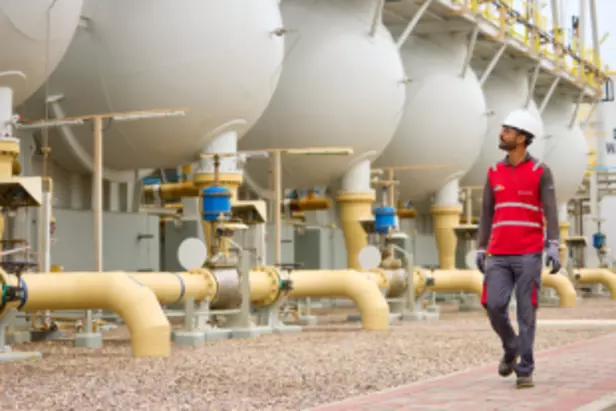
Morocco
Veolia and the Kingdom of Morocco are launching the construction of Africa's largest desalination plant near Rabat. In response to a historic drought, the 822,000 m3/day facility will supply drinking water to 9.3 million inhabitants. Operated by Veolia for 35 years, the plant will use renewable energies, thus reducing its environmental impact.
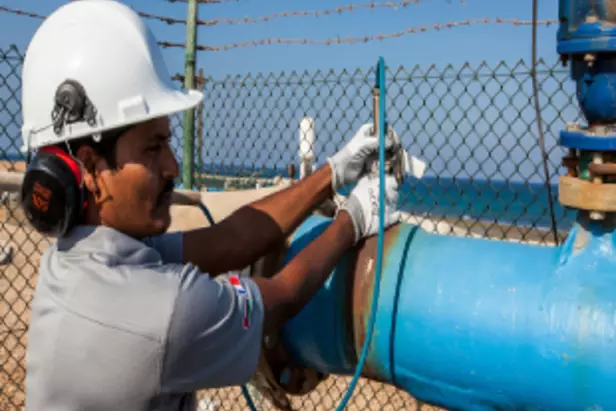
In November 2015, we signed a memorandum of understanding with a public investment company. The agreement covers the joint creation of a seawater desalination plant in Aktau, on the coast of the Caspian Sea. The new plant has a daily capacity of 125,000 m3. The aim? To provide water to industrial sites and to the population of the region’s two main towns, Aktau and Janaozen.
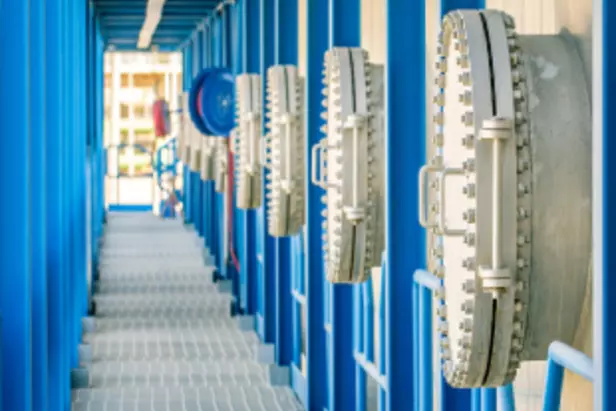
The Az Zour South plant, which operates using reverse osmosis, is the second largest seawater desalination plant in Kuwait. With a daily water treatment capacity of 136,450 m3, this plant has a special feature: seawater is pre-heated using waste heat from a nearby power plant, resulting in significant electricity savings on site.
Did you know?
How does the seawater desalination process work?
The seawater desalination process is based on a series of rigorously controlled steps to ensure the production of quality water while optimizing energy performance. Several technologies enable the separation of salt and impurities from water to make it drinkable or usable for industrial applications. Everything starts with the collection of raw water, either directly from the sea or through beach wells. The water thus collected is roughly filtered so as not to damage the pumps, then undergoes a pre-treatment, which is more or less advanced depending on the desalination technology used.
The heart of the desalination process is based on two major technologies:
- Thermal distillation or thermal desalination: seawater is heated, turned into steam, and then condensed into fresh water. This technique includes several variants, notably multi-stage flash distillation (MSF) and multi-effect distillation (MED), which optimize energy efficiency.
- Reverse osmosis or desalination by membrane treatment: Salt water is subjected to high pressure to pass through a semi-permeable membrane that retains salts and impurities. This process is the most widely used today because of its lower energy consumption compared to thermal solutions.
Depending on the context and local constraints, these two technologies, distillation and reverse osmosis, can be used alone or as part of a hybrid approach where they are combined to optimize yield and reduce energy consumption. Other emerging alternatives, such as electrodialysis and nanofiltration, offer additional options to address the challenges related to the scarcity of fresh water resources.
Once desalinated, the water undergoes post-treatment - remineralization and disinfection - to make it suitable for consumption and to ensure its compliance with health standards before distribution. Moreover, the management of saline discharges is an essential component of the process: the brine resulting from desalination is diluted and discharged into the marine environment via specific systems to limit their environmental impact.
Thanks to its expertise in water treatment, energy optimization of processes and digital, Veolia designs desalination facilities that combine performance, reliability and durability, meeting the needs of cities as well as industries.
Where is sea water desalination mainly used?
Sea water desalination is mainly used in areas where local fresh water resources are limited or under severe water stress. These facilities can be found in arid or semi-arid regions, notably in the Middle East, Australia, parts of southern Europe and on the west coast of the United States. These coastal areas, often subject to strong demographic pressure and increased water needs, call on desalination to secure drinking water supply for their inhabitants and support their economic development. In the Middle East, for example, desalination covers up to 90% of water needs in some countries such as Saudi Arabia or the United Arab Emirates. In addition, more and more industries, particularly in the petrochemical, energy and manufacturing sectors, also use this technology to meet their water needs, especially in geographies where access to quality water resources is limited.
What are the solutions for improving the energy efficiency of desalination systems?
The energy efficiency of desalination systems is a major challenge in the face of increasing water needs and environmental constraints. Today, the most widespread technologies, such as reverse osmosis, still require a significant amount of energy - between 3 and 6 kWh per cubic meter of desalinated water, depending on salinity and specific installation conditions. However, technological advancements allow for continuous optimization of these processes. For example, the integration of energy recovery systems, which can reduce consumption by up to 60%, represents a substantial improvement. Hybrid installations, combining distillation and reverse osmosis, also bring benefits in terms of reducing energy demand. Digital and artificial intelligence also contribute to improving the energy performance of desalination plants, particularly those using reverse osmosis. Finally, the choice of renewable energy sources in some desalination projects, such as the use of solar panels or wind energy, contributes to improving the environmental sustainability of these installations. Veolia strives, in each project, to optimize energy efficiency while minimizing carbon impact, particularly by promoting as much as possible the integration of green energy sources into its desalination plants.


